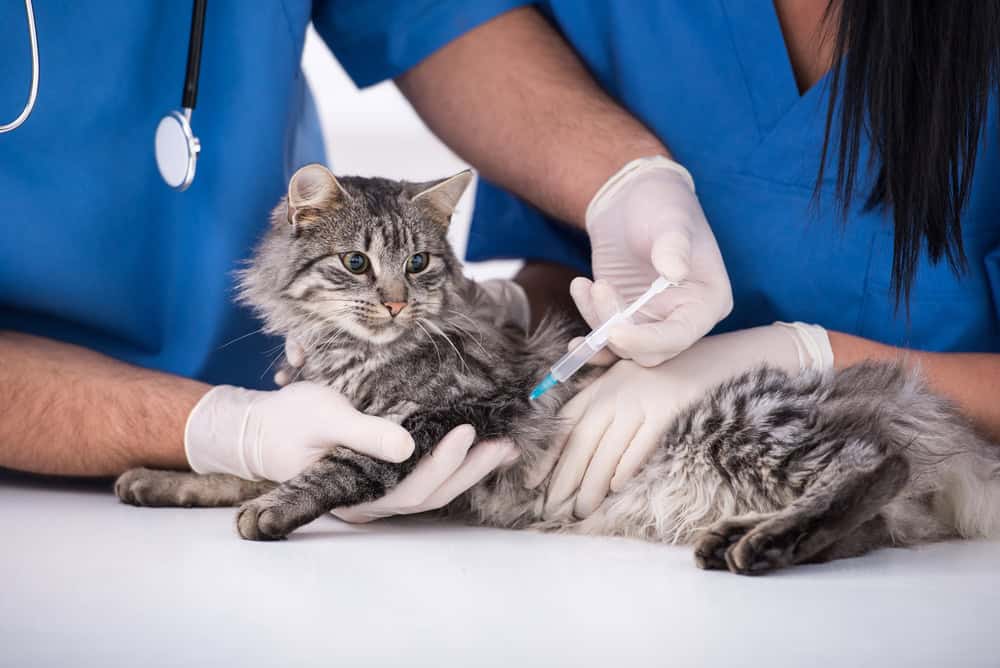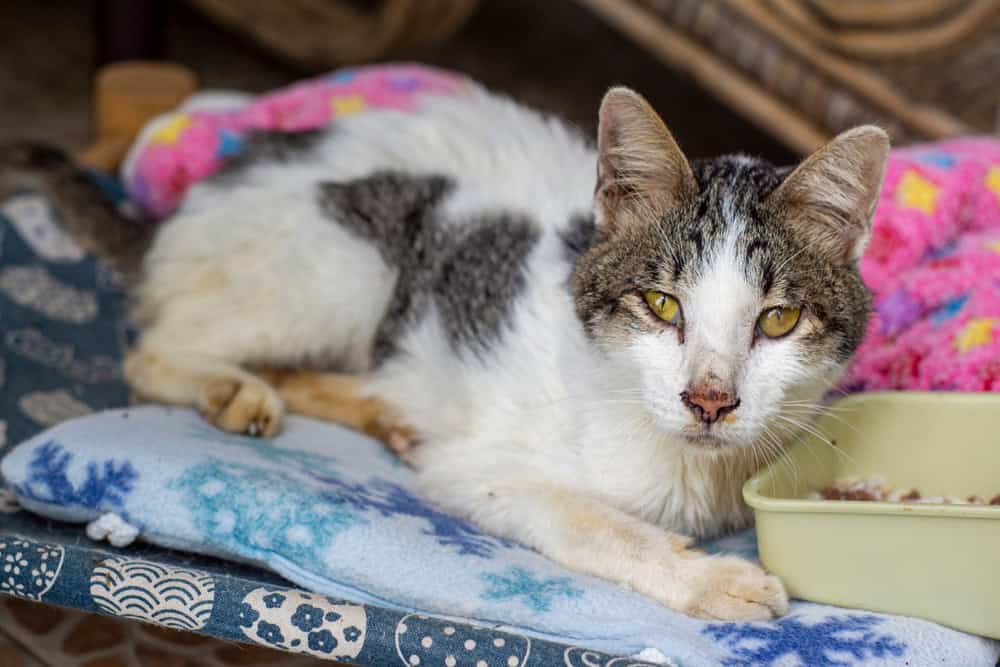Feline viral diseases are a significant concern for cat owners and veterinarians alike. These diseases include common conditions, such as feline calicivirus (FCV) and feline herpesvirus (FHV-1), and the less common but more severe feline leukemia virus (FeLV) and feline infectious peritonitis (FIP). Their prevalence underscores the importance of understanding and addressing these diseases that can affect cats of any age or breed. To learn about these diseases, read our Advanced Veterinary Care of Pasco team’s guide to safeguarding your whiskered pal’s health and well-being.
Feline calicivirus
FCV is a highly contagious viral infection that can cause various signs, including sneezing, nasal discharge, mouth ulcers, and fever. The virus is transmitted through direct contact with an infected cat or contaminated objects such as food and water bowls or bedding. Additionally, FCV can spread through respiratory secretions, making transmission easy in environments where multiple cats live.
Veterinary care often includes supportive therapy to alleviate signs. Treatment may include antibiotics for secondary infections. Vaccination is the best preventive strategy for FCV, as well as maintaining good hygiene and minimizing contact with infected cats or contaminated objects.
Feline viral rhinotracheitis
Feline viral rhinotracheitis (FVR), or FHV-1, is a common viral infection in cats that primarily spreads through direct contact with an infected cat or exposure to respiratory secretions. The virus can also be transmitted through shared food and water bowls, bedding, and other contaminated objects. Stress or a weakened immune system can trigger a viral flare-up, leading to signs such as sneezing, nasal discharge, and painful eye problems that can cause blindness.
FHV-1 treatment typically involves managing the signs with supportive care, including antiviral medications and antibiotics for secondary infections. Providing a stress-free environment and maintaining good hygiene can help reduce flare-ups’ frequency and severity.
Vaccination is the best preventive strategy for FHV-1. To reduce your cat’s risk of contracting this virus, minimize their contact with unvaccinated or infected cats and contaminated objects. Regular veterinary checkups and vaccinations are also crucial to helping your cat avoid this virus.
Feline immunodeficiency virus
Feline immunodeficiency virus (FIV) is a viral infection that affects cats’ immune systems, similar to the human immunodeficiency virus (HIV). FIV can weaken a cat’s immune system over time, making them susceptible to other infections and diseases. FIV is primarily transmitted through bite wounds from infected cats, and no cure is currently available. Initial signs include fever, depression, and swollen lymph nodes. Cats with FIV also typically have relatively severe dental disease.
To prevent your cat from contracting FIV, keep them indoors to minimize their exposure to infected cats. Regular veterinary checkups and testing can also aid in this virus’s early detection and management, contributing to communities’ overall FIV prevention efforts.
Feline leukemia virus
FeLV is a severe and potentially life-threatening feline viral infection. FeLV is primarily transmitted through close contact with infected cats, such as mutual grooming, biting, and sharing food and water bowls. If your cat has contracted FeLV, they may exhibit any of these signs:
- Weight loss
- Appetite loss
- Pale or inflamed gums
- Skin, urinary bladder, and upper respiratory tract infections
- Persistent diarrhea
- Seizures
- Lethargy and weakness
- Enlarged lymph nodes
Note that some cats infected with FeLV may not show signs for an extended period, while others may display illness signs relatively quickly. If you suspect your cat has been exposed to FeLV or is showing any of these signs, consult with our veterinary team as soon as possible for testing, diagnosis, and treatment.
Feline infectious peritonitis
FIP, caused by certain feline coronavirus strains, is a severe and often fatal viral disease. Because of this virus’s complex nature, prevention is challenging, as the feline coronavirus is prevalent in the environment and can infect cats without necessarily leading to FIP. Cats’ FIP signs vary depending on the strain a cat contracts. Common signs include fever, weight loss, jaundice, abdominal swelling attributable to fluid accumulation, and neurologic abnormalities. Cats may also exhibit appetite loss, depression, or difficulty breathing.
Preventing feline viral diseases

Vaccination is crucial to help prevent your cat from contracting viral diseases. Vaccinations stimulate a cat’s immune system to produce protective antibodies against specific diseases. Kittens, in particular, need a series of vaccines on a schedule to support their immature immune systems.
Proper nutrition also plays a vital role in strengthening your cat’s immune system. A balanced diet rich in essential nutrients, such as vitamins E and C and omega-3 fatty acids, can help support a cat’s immune function. Providing high-quality protein and adequate hydration through wet food can also contribute to your cat’s overall health and immunity.
In addition, environmental enrichment can help reduce a cat’s stress by stimulating their natural behaviors and providing mental and physical stimulation. Creating a peaceful and secure environment with hiding spots and perches offers your cat a sense of control and security, reducing their stress level.
Feline viral disease can affect your cat, especially if their vaccinations are not up to date or they are unvaccinated. These feline viral diseases lead to health issues that cause discomfort, illness, and even death. Prioritize your cat’s health and well-being by understanding these diseases and how to prevent your cat from contracting them. If you have questions regarding your cat’s risk level for contracting viral diseases, contact our Advanced Veterinary Care of Pasco team.

